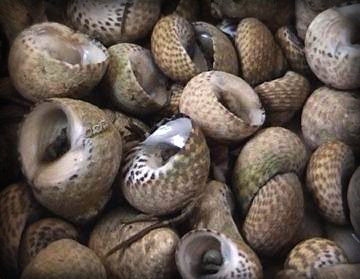The next addition to our collection of exclusive flash fiction pieces is Periwinkle Kidnap by Welsh novelist, poet, and translator Siân Melangell Dafydd.
Periwinkle is the colour of airmail letters. Is a flower shaped like a watermill wheel, around an inch in diameter, with a five-lobed corolla, which blooms from early spring to mid summer, is good ground cover. Is a Crayola crayon colour since 1949. Is also a small edible sea snail from the Atlantic Ocean, found in tidal zones, less famous and smaller than escargot but taste more like clams, briny like the ocean itself, but sweeter.
In the market, she finds one of them on the floor under the fish stall. She cheats the laws of things. This isn’t stealing, it’s taking. If she keeps it alive, it will definitely not be stealing.
On the way home, she asks the fishmonger for its name, how it lives and what it eats. This is bigorneau, he says, and eats, I don’t know what it eats. He asks his colleague who looks down the slope of sea trout to tell her it probably eats seaweed and it definitely lives in seawater.
Des petites algues. Pas de poissons.
She says, des petites algues, spitting the ts, des petites algues, she says again, looking at the inky lump in her hand. Pas des poissons. Squat in the well of her mouth, ts, forming a cupid’s bow.
She finds sea salt and spirulina in the kitchen. She makes a temporary sea on an Ikea plate: 5 millimetres of water and petrol-green algae on the surface.
We have all it takes to keep a periwinkle alive. All will be well.
The plate is put on the terrace because the sea lives outside, not indoors, and after a story, she goes to bed.
It snows overnight. On the terrace table, the water has frozen in the well of the plate, spirulina creeping up the periwinkle’s sides. Her socks soak snow. She cracks him out of its solid seawater and kisses the shell.
Did we kill him? – she asks, as shifts her neck and shoulder blades as if she herself is retracting into a shell from the real world where the periwinkle is dead, deep into another world one where maybe it isn’t.
Can we wake him? – she asks, and places it back on the plate with its sea and its food.
We eat breakfast with the backs of our chairs to him, out there: yesterday’s bread, chocolate spread, bananas. She wants to know why her grandmother died.
The presence of this periwinkle invokes the memory of the deceased. Not just relatives but famous poets. In the same building, Mallarmé had lived, we all nod. The taste of coffee improves.
She makes the piglet noises of deep sleep while she thinks of something we’ll never understand and squashes a banana into her mouth. We make coffee last longer – somehow that is also because of the snow and the death. Conversations find a new counterpoint. We discuss the homeless and where they might be today, the plastic island in the Pacific, tai chi moves for better balance so we don’t trip over, and where in our bodies we feel love – somewhere deep behind our belly-button, plugged in. All this because a periwinkle was stolen and died on our watch.
Periwinkle Kidnap by Siân Melangell Dafydd is part of a Wales Arts Review series publishing original flash fiction pieces by some of Wales’ top authors in a celebration of the unique literary genre and National Flash Fiction Day.












